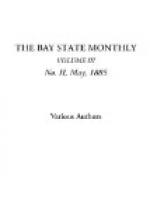All along the route Lincoln preached the gospel of confidence, conciliation, and peace. Notwithstanding the ominous signs of the times, he had such an abiding faith in the people as to believe that the guarantees of all their rights under the Constitution, of non-intervention with the institution of slavery where it existed, and the assurance of a most friendly spirit on the part of the new President would calm the heated passion of the men of the South, would reclaim States already in secession, and would retain the rest of the cotton States under the banner of the Union. What a striking evidence of the lingering hope and of the tender heart of the President is afforded by his first inaugural address!
“In your hands, my dissatisfied fellow-countrymen, and not in mine, is the momentous issue of civil war.
“The Government will not assail you. You can have no conflict without being yourselves the aggressors; you can have no oath registered in heaven to destroy the Government, while I shall have the most solemn one,—’to preserve, protect, and defend it.’
“I am loath to close. We are not enemies, but friends. We must not be enemies. Though passion may have strained, it must not break, our bonds of affection.
“The mystic chords of memory, stretching from every battle-field and patriot grave to every living heart and hearth-stone all over this broad land, will yet swell the chorus of the Union when again touched, as surely they will be, by the better angels of our nature.”
Abraham Lincoln took the helm of government in more dangerous times and under more difficult and embarrassing circumstances than any of the fifteen presidents who preceded him. The ship of Union was built and launched and first commanded by Washington.
“He knew what master laid her keel,
What workmen wrought her ribs of steel,
Who made each mast, and sail,
and rope,
What anvils rang, what hammers beat,
In what a forge and what a heat
Were shaped the anchors of
her hope.”
The men whom he chose as her first crew were those who had helped to form her model. During succeeding generations inefficient hands were occasionally shipped to take the place of worn-out members of the original crew. Often the vessel was put out of her course to serve the personal ends of this or that sailor, and ere long mutiny broke out among her passengers, headed by John C. Calhoun, of South Carolina. Finally, a man ignorant in the science of astronomy and navigation, feeble alike in heart and arm, became, nominally, commander, but really the cat’s-paw, of his crew, at whose bidding the ship was steered. When Abraham Lincoln was called to the helm he found the once stanch, strong vessel in a leaky, damaged condition, with her compasses deranged, her rudder broken, and the luminous star by which Washington guided his course dimmed by a cloud of disunion and doubt. When the belching cannon opened upon Sumter, then it was that the ship of State was found to be all but stranded on the shoals,—Treason.




